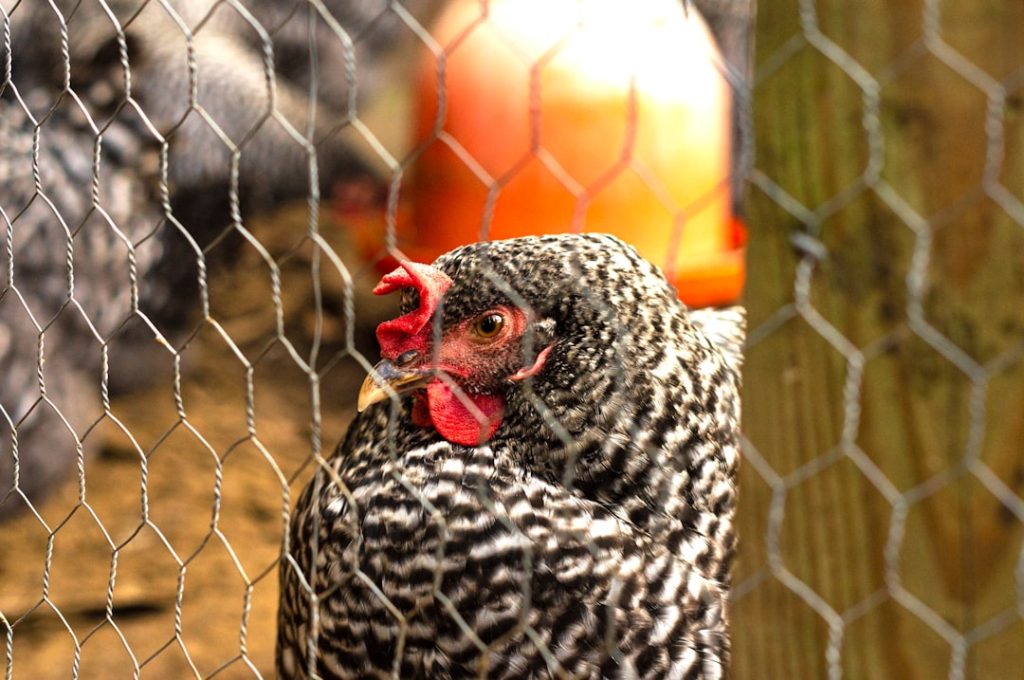Effective chicken-proof fencing is essential for protecting gardens from foraging birds. Several options are available, each with distinct advantages and disadvantages. Chicken wire, a thin and flexible material, is cost-effective and easy to install but may not provide long-term protection as chickens can potentially squeeze through or damage it over time.
Hardware cloth, a sturdier wire mesh, offers enhanced durability and security but at a higher cost. Electric fencing can effectively deter chickens through mild shocks, though it requires a power source and regular maintenance. Solid barriers such as wooden or metal panels provide robust protection against chickens but may be more expensive and labor-intensive to install.
These options may also impact the garden’s aesthetics more significantly than wire fencing. The choice of fencing depends on various factors, including budget, garden size, and personal preferences. When selecting a chicken-proof fence, it is crucial to consider the specific requirements of the garden and the behavior patterns of the chickens to ensure optimal protection.
Table of Contents
- 1 Natural Deterrents for Chickens
- 2 Installing Chicken-Proof Fencing
- 3 Creative Design Ideas for Chicken-Proof Fencing
- 4 Maintaining and Repairing Chicken-Proof Fencing
- 5 Alternative Methods to Keep Chickens Out of the Garden
- 6 Tips for Keeping Chickens from Damaging Garden Plants
- 7 FAQs
- 7.1 What are some effective garden fence ideas to keep chickens out?
- 7.2 How high should a garden fence be to keep chickens out?
- 7.3 What materials are best for a garden fence to keep chickens out?
- 7.4 Are there any natural deterrents to keep chickens out of the garden?
- 7.5 How can I ensure that my garden fence is secure and chicken-proof?
Key Takeaways
- Chicken-proof fencing options include hardware cloth, electric netting, and welded wire
- Natural deterrents for chickens include planting thorny bushes and using predator decoys
- When installing chicken-proof fencing, make sure it is buried at least 12 inches deep to prevent digging
- Creative design ideas for chicken-proof fencing include using recycled materials and incorporating decorative elements
- Regularly inspect and repair chicken-proof fencing to ensure it remains effective in keeping chickens out
- Alternative methods to keep chickens out of the garden include using motion-activated sprinklers and creating designated chicken areas
- Tips for keeping chickens from damaging garden plants include providing alternative sources of entertainment and ensuring they have enough space to roam
Natural Deterrents for Chickens
Natural Barriers
In addition to using fencing, certain plants can be used as a natural barrier to keep chickens out of your garden. Planting marigolds, lavender, or rosemary around the perimeter of the garden can be an effective way to deter chickens. These strong-smelling plants are known to repel chickens, making them an excellent natural deterrent.
Uncomfortable Surfaces
Another natural deterrent is to use mulch or gravel around garden beds. Chickens generally do not like walking on these surfaces, so by creating an uncomfortable environment, you can discourage them from entering the garden. This method is simple yet effective in keeping chickens away.
Startling Deterrents
Using motion-activated sprinklers can startle and deter chickens from entering the garden. The sudden burst of water can be an effective way to train chickens to stay away from the area without causing them any harm. Additionally, hanging reflective objects such as old CDs or aluminum foil strips around the garden can create flashes of light that can scare chickens away.
Combining Deterrents
These natural deterrents can be used in combination with chicken-proof fencing to provide an extra layer of protection for your garden. By using a combination of these methods, you can create a chicken-free zone and enjoy a thriving garden without the worry of chickens causing damage.
Installing Chicken-Proof Fencing

When installing chicken-proof fencing, it’s important to take the time to do it properly to ensure its effectiveness. Start by measuring the perimeter of your garden and calculating how much fencing material you will need. If you’re using wire fencing, make sure to bury it at least 6 inches deep to prevent chickens from digging underneath it.
If you’re using electric fencing, follow the manufacturer’s instructions for installation and placement of the wires or posts. When installing wooden or metal panels, make sure they are securely anchored in the ground to prevent chickens from knocking them over or squeezing through any gaps. It’s also important to consider the height of the fencing, as chickens are capable of flying short distances and may attempt to fly over low barriers.
For most gardens, a fence height of at least 6 feet is recommended to prevent chickens from flying over it. Additionally, make sure to regularly inspect the fencing for any signs of wear or damage, and make repairs as needed to maintain its effectiveness. Proper installation and maintenance of chicken-proof fencing are essential for keeping your garden safe from unwanted feathered visitors.
Creative Design Ideas for Chicken-Proof Fencing
While the primary purpose of chicken-proof fencing is to keep chickens out of the garden, that doesn’t mean it has to be boring or unsightly. There are several creative design ideas that can make your chicken-proof fencing both functional and visually appealing. One option is to incorporate climbing plants, such as ivy or honeysuckle, along the fence line to create a natural green barrier that also adds beauty to your garden.
Another creative idea is to use decorative metal panels or wooden lattice as fencing material, which can add a touch of elegance and style to your garden while still effectively keeping chickens out. If you’re using wire fencing, consider painting it with a rust-resistant paint in a color that complements your garden’s aesthetic. You can also add decorative elements such as hanging baskets or birdhouses along the fence line to create a charming and inviting atmosphere while still keeping chickens at bay.
Additionally, incorporating a gate into your chicken-proof fencing can provide easy access to your garden while still maintaining security against chickens. By thinking creatively about the design of your chicken-proof fencing, you can create a functional and beautiful barrier that enhances the overall look of your garden.
Maintaining and Repairing Chicken-Proof Fencing
Once you have installed chicken-proof fencing, it’s important to regularly maintain and repair it to ensure its effectiveness over time. Regularly inspect the fencing for any signs of wear, damage, or areas where chickens may be attempting to breach it. If you’re using wire fencing, check for any loose or broken wires and make repairs as needed.
Additionally, make sure that any buried sections of wire fencing remain secure and intact to prevent chickens from digging underneath it. If you’re using electric fencing, regularly test the system to ensure it is delivering a mild shock that will deter chickens from entering the garden. Replace any damaged wires or posts and keep vegetation trimmed away from the electric wires to prevent interference with the system’s effectiveness.
For wooden or metal panels, check for any signs of rot or corrosion and make repairs or replacements as needed to maintain their structural integrity. Regular maintenance and repairs are essential for ensuring that your chicken-proof fencing continues to effectively keep chickens out of your garden. By staying proactive and addressing any issues as they arise, you can prolong the lifespan of your fencing and keep your garden safe from unwanted feathered visitors.
Alternative Methods to Keep Chickens Out of the Garden

Scare Tactics and Sound Deterrents
In addition to using chicken-proof fencing and natural deterrents, scare tactics and sound deterrents can be effective methods to keep chickens out of your garden. Scarecrows or predator decoys can create a sense of danger that will discourage chickens from entering the area. Similarly, wind chimes or motion-activated noise makers can startle and deter chickens from approaching the garden.
Physical Barriers for Plant Protection
Another effective method is using physical barriers such as netting or cloches to protect specific plants or areas of the garden from chicken damage. By covering vulnerable plants with netting or cloches, you can prevent chickens from accessing them while still allowing sunlight and water to reach the plants.
Redirecting Chicken Attention
Creating designated areas for chickens to roam and forage away from the main garden can help redirect their attention and minimize their impact on your plants. This approach can be particularly useful when combined with other methods.
A Comprehensive Approach
By combining alternative methods with chicken-proof fencing and natural deterrents, you can create a comprehensive approach to keeping chickens out of your garden and protecting your plants from damage.
Tips for Keeping Chickens from Damaging Garden Plants
While chicken-proof fencing and other deterrents can help keep chickens out of your garden, there are also several tips for minimizing their impact on your plants if they do manage to gain access. One effective tip is planting sacrificial crops such as grains or greens in an area where chickens are allowed to roam freely. By providing an alternative food source for chickens, you can help reduce their interest in venturing into the main garden area.
Another tip is creating physical barriers around individual plants using wire cages or cloches to protect them from pecking or scratching by chickens. Additionally, regularly pruning and maintaining plants in the garden can help minimize opportunities for chickens to hide or nest among them. It’s also important to provide adequate food and enrichment for your chickens in their designated areas outside of the garden to keep them occupied and less inclined to seek out plants for food or entertainment.
By implementing these tips in conjunction with effective chicken-proof fencing and other deterrents, you can create a harmonious coexistence between your garden and your feathered friends while minimizing damage to your plants.
If you’re looking for garden fence ideas to keep chickens out, you may also be interested in learning about the best way to heat a chicken coop. Poultry Wizard has a helpful article on heater options for a chicken coop that can help you keep your feathered friends warm and comfortable during the colder months.
FAQs
What are some effective garden fence ideas to keep chickens out?
Some effective garden fence ideas to keep chickens out include using hardware cloth or chicken wire with small openings, installing electric fencing, and adding a top barrier to prevent chickens from flying over.
How high should a garden fence be to keep chickens out?
A garden fence should be at least 6 feet high to effectively keep chickens out. This height will prevent them from flying over the fence and gaining access to the garden.
What materials are best for a garden fence to keep chickens out?
Materials such as hardware cloth, chicken wire, and electric fencing are best for keeping chickens out of a garden. These materials are durable and can effectively prevent chickens from accessing the garden area.
Are there any natural deterrents to keep chickens out of the garden?
Some natural deterrents to keep chickens out of the garden include planting thorny bushes or shrubs around the perimeter, using motion-activated sprinklers, and applying strong-smelling repellents such as citrus or garlic.
How can I ensure that my garden fence is secure and chicken-proof?
To ensure that your garden fence is secure and chicken-proof, regularly inspect the fence for any damage or weak spots, reinforce the bottom of the fence to prevent digging, and consider adding a top barrier or electric fencing for added security.
Meet Walter, the feathered-friend fanatic of Florida! Nestled in the sunshine state, Walter struts through life with his feathered companions, clucking his way to happiness. With a coop that’s fancier than a five-star hotel, he’s the Don Juan of the chicken world. When he’s not teaching his hens to do the cha-cha, you’ll find him in a heated debate with his prized rooster, Sir Clucks-a-Lot. Walter’s poultry passion is no yolk; he’s the sunny-side-up guy you never knew you needed in your flock of friends!







